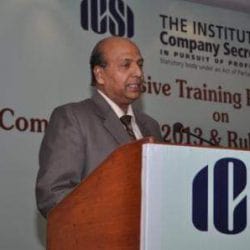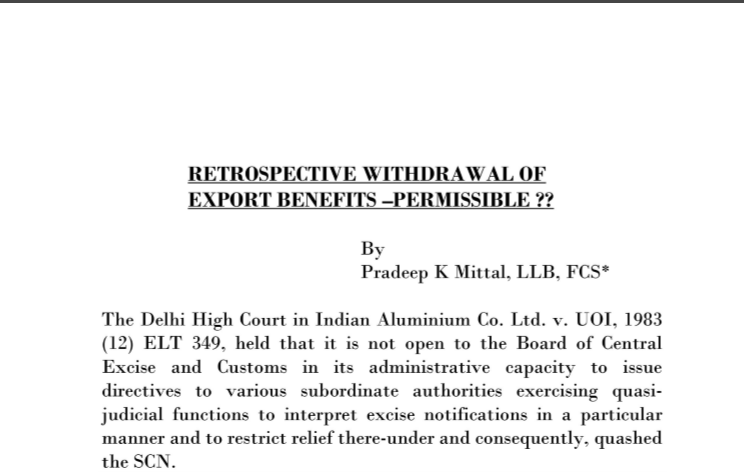Retrospective Withdrawal of Export Benefits –Permissible?
Retrospective Withdrawal of Export Benefits –Permissible?
The Delhi High Court in Indian Aluminium Co. Ltd. v. UOI, 1983 (12) ELT 349, held that it is not open to the Board of Central Excise and Customs in its administrative capacity to issue directives to various subordinate authorities exercising quasi-judicial functions to interpret excise notifications in a particular manner and to restrict relief there-under and consequently, quashed the SCN.
2: In the case of Mahabir Vegetables Oils (P) Ltd. & Anr. v. State of Haryana & Ors.: MANU/SC/8022/2006, the Supreme Court had held as under:-
It is beyond any cavil that subordinate legislation can be given a retrospective effect and retroactive operation. The rule-making power is a species of delegated legislation. A delegate, therefore, can make rules only within the four corners thereof.
42. It is a fundamental rule of law that no statute shall be construed to have a retrospective operation unless such a construction appears very clearly in the terms of the Act.
3: The DB of Bombay High Court in Noble Resources and Trading India Pvt. Ltd. v. UIO: MANU/MH/1282/2011 examined the challenge to a notification dated 31.03.2011 issued by DGFT whereby schedule of rates under the Duty Entitlement Pass Book (DEPB) Scheme was amended to disentitle export of cotton with respect to shipments made on or after 21.04.2010. The High Court has quashed the circular by holding that by mere issuance of a Circular, rate of export benefits cannot be curtailed.
4: The Hon’ble High Courts have held that Power to legislate retrospectively is not inherent, and has to be specifically conferred by statute no such power seems to emanate, either from Section 5 of the Foreign Trade (Development and Regulation) Act, 1992 or from Para 1.2 of the FTP as having been held in (a) Shri Hari Exports v. DGFT, MANU/DE/0075/1994, (b) Hoewitzer Organic Chemicals Co. v. DGFT, MANU/TN/0692/2013 (c) and Intolcast Pvt. Ltd. and Ors. vs. UIO: MANU/GJ/2292/2016
5: The Supreme Court in DGFT Vs. Kanak Exports and Ors. MANU/SC/1258/2015 has observed as under:-
Section 5 of the Act does not empower the Government to make amendments with retrospective effect, thereby taking away the rights which have already accrued in favour of the exporters under the Scheme. No doubt, the Government has, otherwise, the power to amend, modify or withdraw a particular Scheme which gives benefits to a particular category of persons under the said Scheme. At the same time, if some vested right has accrued in favour of the beneficiaries who achieved the target stipulated in the Scheme and thereby became eligible for grant of duty credit entitlement, that cannot be snatched from such persons/exporters by making the amendment retrospectively.
6: The DB Delhi High Court in Lennox James Ellis vs. UIO: MANU/DE/0018/2019 has observed as under:-
On the other hand, it is well settled that a statute which merely prescribed, inter alia, the procedure is presumed to be retrospective unless such construction is textually inadmissible as has been held in Hitendra Vishnu Thakur v. State of Maharashtra, MANU/SC/0526/1994.
7: The SC in CCE Vs Kores (India) Ltd. MANU/SC/1510/1997 has held that a quasi-judicial body exercising quasi-judicial powers were not bound by the directions of the Central Board of Excise and Customs.
8: The Supreme Court in State of MP Vs. G.S. Dall and Flour Mills MANU/SC/0191/1991 have held “executive instructions can supplement a statute or cover area as to which the statute does not extend but, however, they cannot run contrary to statutory provisions or whittle down their effect”.
9: The Supreme Court in Bindeshwari Ram v. the State of Bihar & others (MANU/SC/0080/1989 holding that the executive instructions cannot prevail over the statutory rules and in absence of statutory rules, executive instructions have no relevance or force.
Read the copy:
 Advocate Pradeep Kumar
Advocate Pradeep Kumar
PK Mittal BCom Delhi university 1975 LLB Delhi University 1978 FCS Fellow Member of ICSI 1992 1982 to 1992 as CS in Corporate Head Legal Apollo Tyres Ltd 1986 to 1992 1993 onwards Advocate in Delhi High Court CESTAT NCLT = Practcising Indirect Tax and Corporate laws 1993 to till date. Written more than 100 Article on Company Law and Corporate laws Indirect Tax Speaker on Indirect Tax Co Law and IBC in various Seminars Workshop organised by ICAI ICSI and ICMA and other organisations Convenor Core Group on GST of ICSI








